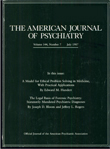Clinical and Neurocognitive Aspects of Source Monitoring Errors in Schizophrenia
Abstract
OBJECTIVE: Source monitoring, an aspect of memory that involves judgments about the origin of information, has been found to be more prone to errors in schizophrenic subjects than in normal persons. To examine the precise nature of such errors and their relationship to clinical and neurocognitive variables, the authors compared schizophrenic and normal subjects. METHOD: Schizophrenic subjects who had been medication free for 1 week (N=26) and demographically matched normal subjects (N=21) performed a source monitoring task and were assessed on current psychiatric symptoms, IQ, and frontal lobe functioning. RESULTS: The schizophrenic subjects had normal recognition memory of target words (recognition hits) and a normal generation effect but made more errors than the comparison subjects in identifying the source of target words. Specifically, the schizophrenic subjects made more errors in remembering the source of new and self-generated items, and they tended to attribute items to an external source. In 11 retested subjects, these errors were stable and independent from medication status after a 2-year interval. Secondary analyses suggested that certain source monitoring errors may be associated with hostility and lower IQ. When the effect of IQ was controlled, correlations with frontal dysfunction were not significant. CONCLUSIONS: Schizophrenic subjects make significantly more source monitoring errors than normal subjects, but not because of problems with recognition memory hits or with the generation effect. This tendency may be trait like and may be related to hostility. Lower IQ in schizophrenia plays a partial role in these errors, but frontal dysfunction does not. (Am J Psychiatry 1997; 154:1530–1537)



